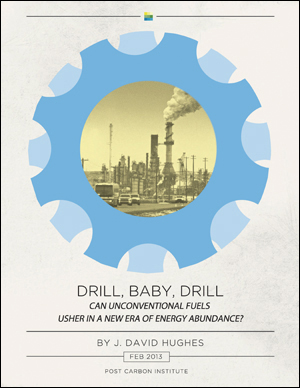
Drill, Baby, Drill: Can Unconventional Fuels Usher in a New Era of Energy Abundance?
February 19, 2013
In this landmark report, PCI Fossil Fuel Fellow David Hughes takes a far-ranging and painstakingly researched look at the prospects for various unconventional fuels to provide energy abundance for the United States in the 21st Century. While the report examines a range of energy sources, the centerpiece of “Drill, Baby, Drill” is a critical analysis of shale gas and shale oil (tight oil) and the potential of a shale “revolution.”
Abstract
It’s now assumed that recent advances in fossil fuel production – particularly for shale gas and shale oil – herald a new age of energy abundance, even “energy independence,” for the United States. Nevertheless, the most thorough public analysis to date of the production history and the economic, environmental, and geological constraints of these resources in North America shows that they will inevitably fall short of such expectations, for two main reasons: First, shale gas and shale oil wells have proven to deplete quickly, the best fields have already been tapped, and no major new field discoveries are expected; thus with average per-well productivity declining and ever-more wells (and fields) required simply to maintain production, an “exploration treadmill” limits the long-term potential of shale resources. Second, although tar sands, deepwater oil, oil shales, coalbed methane, and other non-conventional fossil fuel resources exist in vast deposits, their exploitation continues to require such enormous expenditures of resources and logistical effort that rapid scaling up of production to market-transforming levels is all but impossible; the big “tanks” of these resources are inherently constrained by small “taps.”
About the Author
J. David Hughes is a geoscientist who has studied the energy resources of Canada for nearly  four decades, including 32 years with the Geological Survey of Canada as a scientist and research manager. He developed the National Coal Inventory to determine the availability and environmental constraints associated with Canada’s coal resources.
four decades, including 32 years with the Geological Survey of Canada as a scientist and research manager. He developed the National Coal Inventory to determine the availability and environmental constraints associated with Canada’s coal resources.
As Team Leader for Unconventional Gas on the Canadian Gas Potential Committee, he coordinated the recent publication of a comprehensive assessment of Canada’s unconventional natural gas potential. Over the past decade, he has researched, published and lectured widely on global energy and sustainability issues in North America and internationally.
He is a board member of the Association for the Study of Peak Oil and Gas – Canada and is a Fellow of the Post Carbon Institute. He recently contributed to Carbon Shift, an anthology edited by Thomas Homer-Dixon on the twin issues of peak energy and climate change, and his work has been featured in Nature, Canadian Business, and other journals, as well as through the popular press, radio, television and the internet. He is currently president of a consultancy dedicated to research on energy and sustainability issues.







